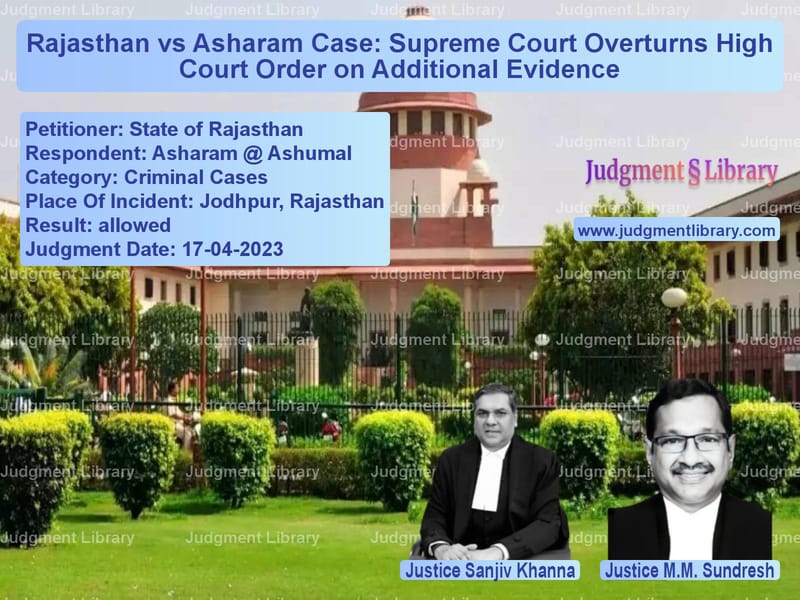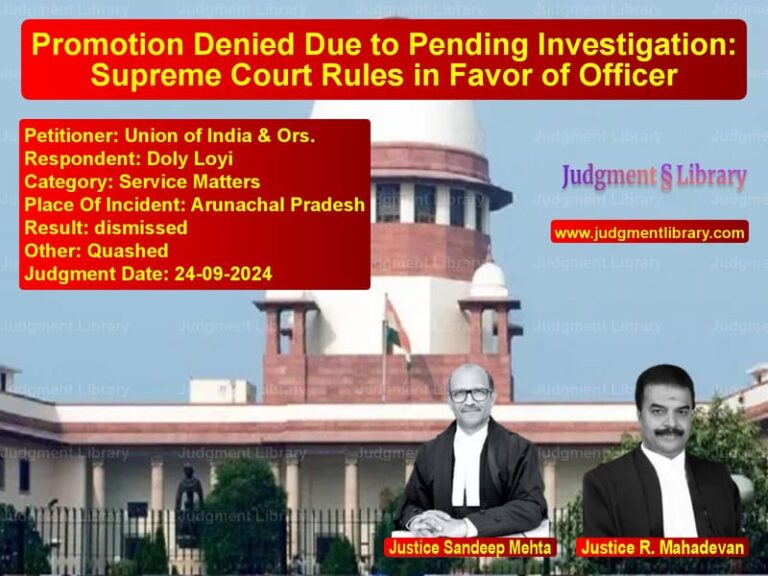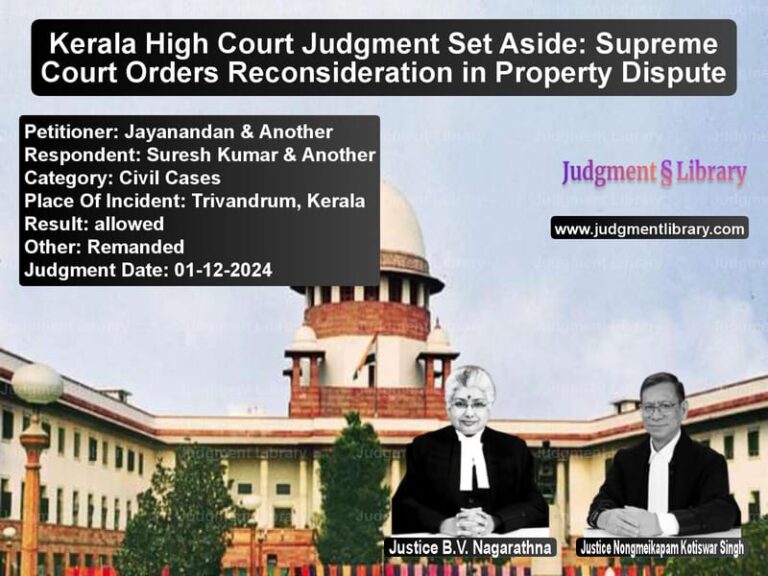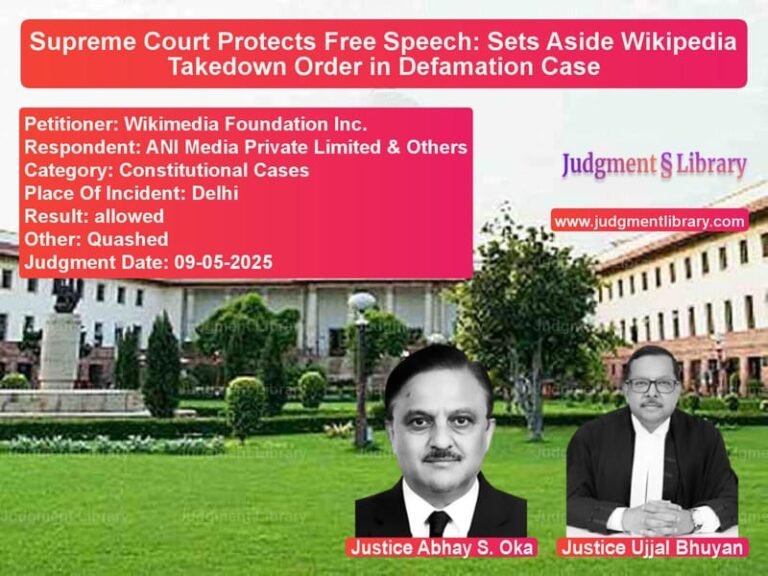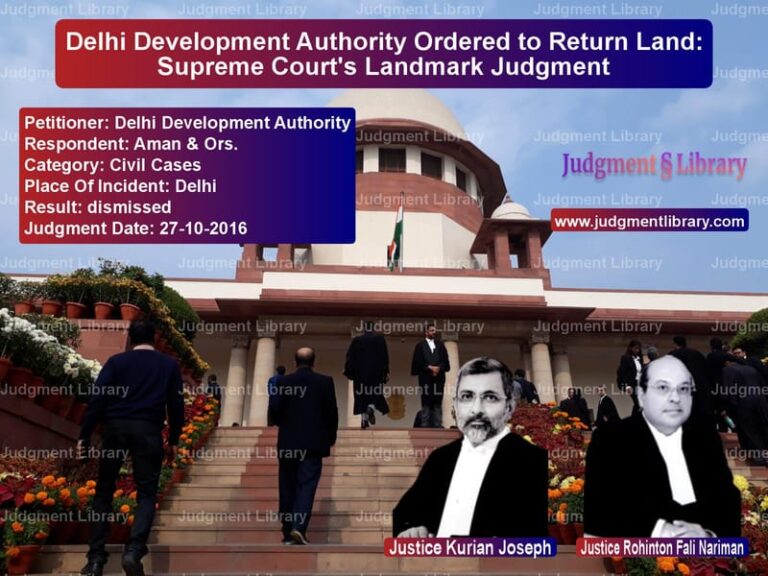Rajasthan vs Asharam Case: Supreme Court Overturns High Court Order on Additional Evidence
The case involving the State of Rajasthan versus Asharam, popularly known as Ashumal, gained significant national attention due to its high-profile nature and severe allegations. The case revolves around the sexual assault of a minor victim, which took place in August 2013 at Jodhpur, Rajasthan. Initially, the victim filed a written complaint leading to the registration of a ‘Zero’ FIR at Police Station Kamla Market, Delhi, which was subsequently transferred to Jodhpur for further investigation due to jurisdictional concerns.
The investigation, led by Chanchal Mishra, Assistant Commissioner of Police (West), Jodhpur, included detailed statements from the victim recorded under Section 161 of the Cr.P.C. (Exhibit D-2), as well as Section 164 of the Cr.P.C. These statements formed the foundation of a lengthy trial that lasted nearly five years. Ultimately, the trial court found Asharam guilty, convicting him under multiple sections of the Indian Penal Code (IPC) and the Protection of Children from Sexual Offences Act (POCSO Act), resulting in life imprisonment.
High Court Controversy Over Additional Evidence
While Asharam’s appeal against this conviction was pending before the Rajasthan High Court, he filed an application under Section 391 of the Cr.P.C., seeking permission to summon additional evidence from Ajay Pal Lamba, former Deputy Commissioner of Police, who authored the book “Gunning For The Godman: The True Story Behind Asaram Bapu’s Conviction”. According to Asharam’s defence, Lamba’s mention in the book about recording a video of the crime scene (‘Kutiya’) on his mobile phone indicated that the victim could have been tutored based on this footage. The Rajasthan High Court initially accepted this reasoning and allowed the application.
Petitioner’s Arguments (State of Rajasthan)
- The High Court’s decision to summon Lamba was based on speculative reasoning, lacking concrete evidence.
- There was no indication or material suggesting the victim was shown or influenced by Lamba’s alleged video.
- Permitting additional evidence at this stage was unjustified and would unduly delay proceedings.
Respondent’s Arguments (Asharam @ Ashumal)
- The victim’s detailed account of the crime scene was allegedly derived from the video recorded by Ajay Pal Lamba.
- This additional evidence was crucial to prove the alleged coaching of the victim, thereby impacting the credibility of her statements significantly.
Supreme Court’s Key Observations
The Supreme Court critically evaluated the arguments and reiterated crucial findings from the trial court, specifically stating:
“In my humble opinion circumstances make statements more than the witnesses. It is notable that PW-43 Chanchal Mishra, Investigation Officer, in her statement has told that after conducting the inspection of the place of incident… details of inside Kutiya which has been told by the victim without going inside, the same circumstances appear from the site map and circumstances of the site and photographs and matches with it. In my humble opinion it is proved from this evidence that the victim had gone inside the room and had gone in the bathroom too.”
The apex court highlighted the proper use of Section 391 Cr.P.C., clearly emphasizing:
“The touchstone of when additional evidence at the appellate stage may be taken on record is not the impossibility or inability to pronounce the judgment in its absence, but whether there would be a failure of justice without such additional evidence.”
Furthermore, the Supreme Court made it clear that Section 391 Cr.P.C. does not allow appellate courts to reopen evidence based on mere conjecture or speculation.
Final Verdict by Supreme Court
After comprehensive consideration, the Supreme Court reversed the Rajasthan High Court’s decision permitting the summoning of additional evidence, stating unequivocally:
“The plea to examine Ajay Pal Lamba on the ground that he had purportedly recorded a video of the ‘Kutiya’ on his mobile phone is completely inconsequential and irrelevant to the factual matrix of the present case.”
In conclusion, the Supreme Court directed the Rajasthan High Court to expedite the hearing of Asharam’s appeal, underscoring that justice must balance procedural fairness and judicial expediency, particularly given the prolonged incarceration of the respondent.
Petitioner Name: State of Rajasthan.Respondent Name: Asharam @ Ashumal.Judgment By: Justice Sanjiv Khanna, Justice M.M. Sundresh.Place Of Incident: Jodhpur, Rajasthan.Judgment Date: 17-04-2023.
Don’t miss out on the full details! Download the complete judgment in PDF format below and gain valuable insights instantly!
Download Judgment: state-of-rajasthan-vs-asharam-@-ashumal-supreme-court-of-india-judgment-dated-17-04-2023.pdf
Directly Download Judgment: Directly download this Judgment
See all petitions in Custodial Deaths and Police Misconduct
See all petitions in Fraud and Forgery
See all petitions in Juvenile Justice
See all petitions in Other Cases
See all petitions in Judgment by Sanjiv Khanna
See all petitions in Judgment by M.M. Sundresh
See all petitions in allowed
See all petitions in supreme court of India judgments April 2023
See all petitions in 2023 judgments
See all posts in Criminal Cases Category
See all allowed petitions in Criminal Cases Category
See all Dismissed petitions in Criminal Cases Category
See all partially allowed petitions in Criminal Cases Category

